东西方邀请语文化差异共18页
- 格式:ppt
- 大小:686.00 KB
- 文档页数:18
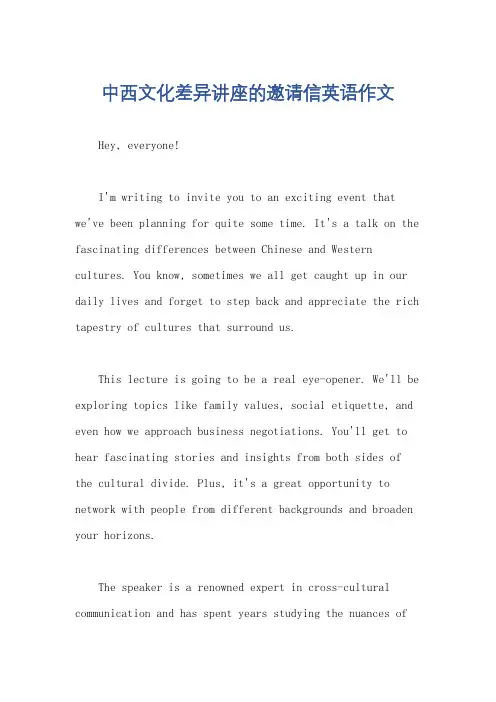
中西文化差异讲座的邀请信英语作文Hey, everyone!I'm writing to invite you to an exciting event thatwe've been planning for quite some time. It's a talk on the fascinating differences between Chinese and Western cultures. You know, sometimes we all get caught up in our daily lives and forget to step back and appreciate the rich tapestry of cultures that surround us.This lecture is going to be a real eye-opener. We'll be exploring topics like family values, social etiquette, and even how we approach business negotiations. You'll get to hear fascinating stories and insights from both sides of the cultural divide. Plus, it's a great opportunity to network with people from different backgrounds and broaden your horizons.The speaker is a renowned expert in cross-cultural communication and has spent years studying the nuances ofChinese and Western cultures. He's got a wealth of knowledge and a great sense of humor, so you can expect a lively and engaging talk.So, mark your calendars and save the date! This is an event that you won't want to miss. Who knows, you might even learn something that changes your perspective on life. See you there!。
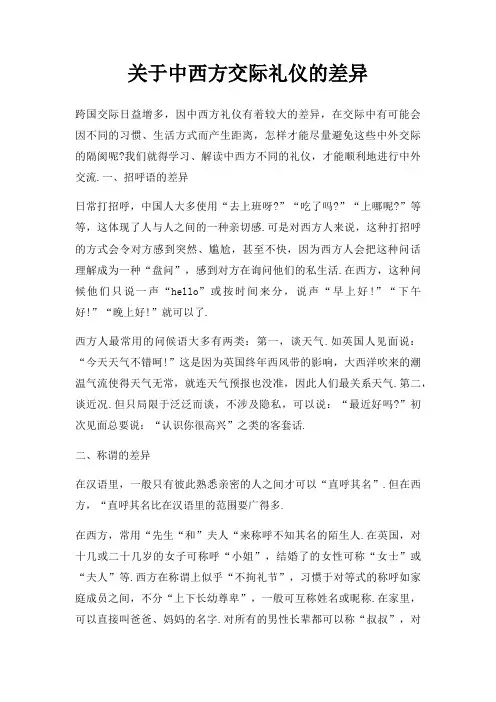
关于中西方交际礼仪的差异跨国交际日益增多,因中西方礼仪有着较大的差异,在交际中有可能会因不同的习惯、生活方式而产生距离,怎样才能尽量避免这些中外交际的隔阂呢?我们就得学习、解读中西方不同的礼仪,才能顺利地进行中外交流.一、招呼语的差异日常打招呼,中国人大多使用“去上班呀?”“吃了吗?”“上哪呢?”等等,这体现了人与人之间的一种亲切感.可是对西方人来说,这种打招呼的方式会令对方感到突然、尴尬,甚至不快,因为西方人会把这种问话理解成为一种“盘问”,感到对方在询问他们的私生活.在西方,这种问候他们只说一声“hello”或按时间来分,说声“早上好!”“下午好!”“晚上好!”就可以了.西方人最常用的问候语大多有两类:第一,谈天气.如英国人见面说:“今天天气不错呵!”这是因为英国终年西风带的影响,大西洋吹来的潮温气流使得天气无常,就连天气预报也没准,因此人们最关系天气.第二,谈近况.但只局限于泛泛而谈,不涉及隐私,可以说:“最近好吗?”初次见面总要说:“认识你很高兴”之类的客套话.二、称谓的差异在汉语里,一般只有彼此熟悉亲密的人之间才可以“直呼其名”.但在西方,“直呼其名比在汉语里的范围要广得多.在西方,常用“先生“和”夫人“来称呼不知其名的陌生人.在英国,对十几或二十几岁的女子可称呼“小姐”,结婚了的女性可称“女士”或“夫人”等.西方在称谓上似乎“不拘礼节”,习惯于对等式的称呼如家庭成员之间,不分“上下长幼尊卑”,一般可互称姓名或昵称.在家里,可以直接叫爸爸、妈妈的名字.对所有的男性长辈都可以称“叔叔”,对所有的女性长辈都可以称“阿姨”.这在我们中国是不行的,必须要分清楚辈分、老幼等关系,否则就会认为你不懂礼貌,分不清上下长幼尊卑了对于家庭成员以外的称呼,中国人往往尊称对方为“李老师”、“陈师傅”,有时在姓后面加上此人当时所担任的职务,如“黄局长”、“王经理”等.但英美人除了几个传统习用的称呼――博士、医生、法官、教授等之外,对“李老师”、“陈师傅”一类的称呼是不能容忍的.也很少听他们称呼别人为“黄局长”“王经理”等.因为这一类称呼还没有变为像“博士、医生、法官、教授”等一样成为传统习用的称呼.三、告别语的差异中西语言中有多种不同的告别语.如在和病人告别时,中国人常说“多喝点开水”、多穿点衣服“、”早点休息“之类的话,表示对病人的关怀.但西方人绝不会说“多喝水”之类的话,因为这样说会被认为有指手画脚之嫌.他们会说“多保重”或“希望你早日康复”等等.一位美国人在和他的中国朋友告别时说:“我会保持联系.”可是这位中国朋友等了一年多也未见只言片语,便抱怨他不讲信用.其实,这句话仅仅是一种告别词语,相当于“再见”,说话人并无他意,更没有作任何许诺.此外,西方文化中如果客人想告别,通常要提前几分钟将告别的意思暗示或委婉地向主人表达,并征得同意,然后才可以离开.如果突然说“时间不早了”,随即站起来和主人告别,这在西方文化中是被认为不礼貌的.。
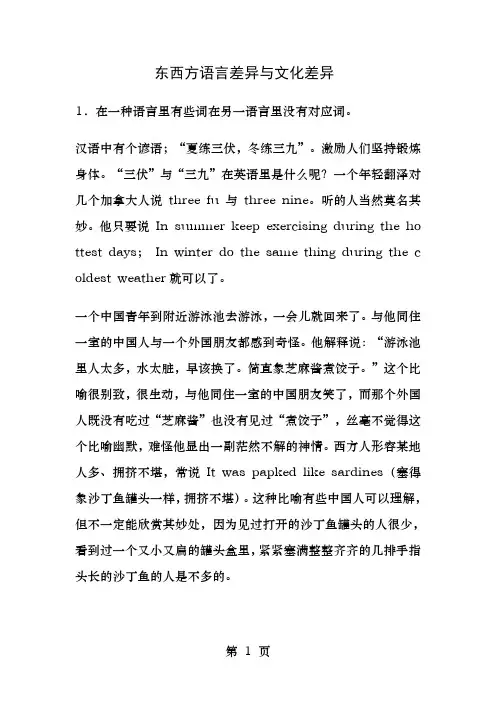
东西方语言差异与文化差异1.在一种语言里有些词在另一语言里没有对应词。
汉语中有个谚语;“夏练三伏,冬练三九”。
激励人们坚持锻炼身体。
“三伏”与“三九”在英语里是什么呢?一个年轻翻泽对几个加拿大人说three fu与three nine。
听的人当然莫名其妙。
他只要说In summer keep exercising during the ho ttest days;In winter do the same thing during the c oldest weather就可以了。
一个中国青年到附近游泳池去游泳,一会儿就回来了。
与他同住一室的中国人与一个外国朋友都感到奇怪。
他解释说:“游泳池里人太多,水太脏,早该换了。
简直象芝麻酱煮饺子。
”这个比喻很别致,很生动,与他同住一室的中国朋友笑了,而那个外国人既没有吃过“芝麻酱”也没有见过“煮饺子”,丝毫不觉得这个比喻幽默,难怪他显出一副茫然不解的神情。
西方人形容某地人多、拥挤不堪,常说It was papked like sardines(塞得象沙丁鱼罐头一样,拥挤不堪)。
这种比喻有些中国人可以理解,但不一定能欣赏其妙处,因为见过打开的沙丁鱼罐头的人很少,看到过一个又小又扁的罐头盒里,紧紧塞满整整齐齐的几排手指头长的沙丁鱼的人是不多的。
日常生活中的用语也有类似现象。
多数英美人从来投有睡过中国的“炕”(kang,a heatable bricked),没有吃过“冰糖葫芦”,(candied haws on a stick),也没有用过中国的“秤”(steelyard)。
大部分中国人没有住过美国的motel(专为开汽车的游客开设的、有停车场的旅馆),没有吃过hamburger (牛肉饼;汉堡牛排;汉堡包),也不需要在上班时由time clock,(出勤记录钟)证明他们是否按时上班。
类似这样的英语词在汉语中都找不到对应词,连词义相近的词也没有。
2.在两种语言里,某些词语表面上似乎指同一事物或概念,其实指的是两回事。

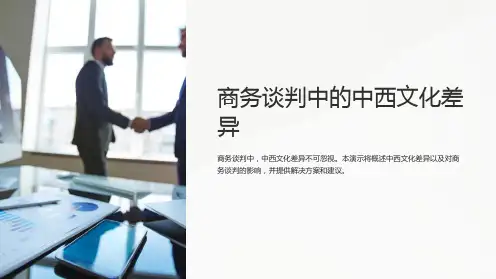
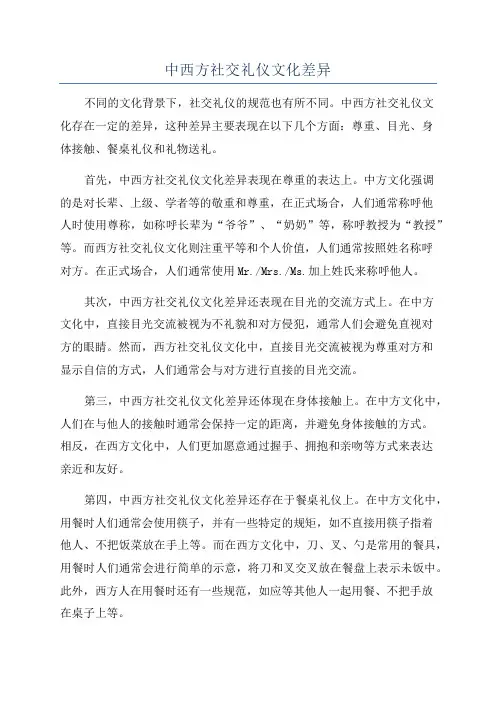
中西方社交礼仪文化差异不同的文化背景下,社交礼仪的规范也有所不同。
中西方社交礼仪文化存在一定的差异,这种差异主要表现在以下几个方面:尊重、目光、身体接触、餐桌礼仪和礼物送礼。
首先,中西方社交礼仪文化差异表现在尊重的表达上。
中方文化强调的是对长辈、上级、学者等的敬重和尊重,在正式场合,人们通常称呼他人时使用尊称,如称呼长辈为“爷爷”、“奶奶”等,称呼教授为“教授”等。
而西方社交礼仪文化则注重平等和个人价值,人们通常按照姓名称呼对方。
在正式场合,人们通常使用Mr./Mrs./Ms.加上姓氏来称呼他人。
其次,中西方社交礼仪文化差异还表现在目光的交流方式上。
在中方文化中,直接目光交流被视为不礼貌和对方侵犯,通常人们会避免直视对方的眼睛。
然而,西方社交礼仪文化中,直接目光交流被视为尊重对方和显示自信的方式,人们通常会与对方进行直接的目光交流。
第三,中西方社交礼仪文化差异还体现在身体接触上。
在中方文化中,人们在与他人的接触时通常会保持一定的距离,并避免身体接触的方式。
相反,在西方文化中,人们更加愿意通过握手、拥抱和亲吻等方式来表达亲近和友好。
第四,中西方社交礼仪文化差异还存在于餐桌礼仪上。
在中方文化中,用餐时人们通常会使用筷子,并有一些特定的规矩,如不直接用筷子指着他人、不把饭菜放在手上等。
而在西方文化中,刀、叉、勺是常用的餐具,用餐时人们通常会进行简单的示意,将刀和叉交叉放在餐盘上表示未饭中。
此外,西方人在用餐时还有一些规范,如应等其他人一起用餐、不把手放在桌子上等。
最后,中西方社交礼仪文化差异还体现在礼物送礼方面。
在中西方的礼物文化中,虽然都强调礼尚往来和表达感激之情,但存在一些不同之处。
中方文化中,人们通常重视礼物的价值和花费,并注重礼物的包装。
而在西方文化中,礼物的重要性不在于价值的大小,而是在于表达情感和对对方的尊重。
此外,西方人在接收礼物时通常会当面进行打开,并表达感谢之情。
总之,中西方社交礼仪文化存在一些差异,这些差异主要体现在尊重、目光、身体接触、餐桌礼仪和礼物送礼等方面。
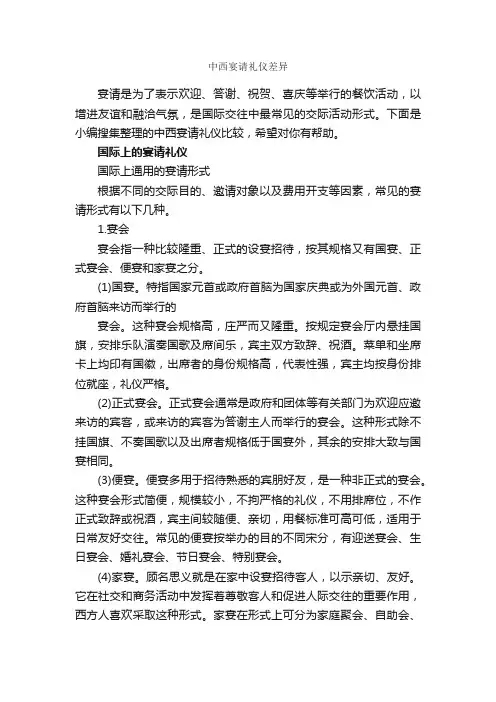
中西宴请礼仪差异宴请是为了表示欢迎、答谢、祝贺、喜庆等举行的餐饮活动,以增进友谊和融洽气氛,是国际交往中最常见的交际活动形式。
下面是小编搜集整理的中西宴请礼仪比较,希望对你有帮助。
国际上的宴请礼仪国际上通用的宴请形式根据不同的交际目的、邀请对象以及费用开支等因素,常见的宴请形式有以下几种。
1.宴会宴会指一种比较隆重、正式的设宴招待,按其规格又有国宴、正式宴会、便宴和家宴之分。
(1)国宴。
特指国家元首或政府首脑为国家庆典或为外国元首、政府首脑来访而举行的宴会。
这种宴会规格高,庄严而又隆重。
按规定宴会厅内悬挂国旗,安排乐队演奏国歌及席间乐,宾主双方致辞、祝酒。
菜单和坐席卡上均印有国徽,出席者的身份规格高,代表性强,宾主均按身份排位就座,礼仪严格。
(2)正式宴会。
正式宴会通常是政府和团体等有关部门为欢迎应邀来访的宾客,或来访的宾客为答谢主人而举行的宴会。
这种形式除不挂国旗、不奏国歌以及出席者规格低于国宴外,其余的安排大致与国宴相同。
(3)便宴。
便宴多用于招待熟悉的宾朋好友,是一种非正式的宴会。
这种宴会形式简便,规模较小,不拘严格的礼仪,不用排席位,不作正式致辞或祝酒,宾主间较随便、亲切,用餐标准可高可低,适用于日常友好交往。
常见的便宴按举办的目的不同宋分,有迎送宴会、生日宴会、婚礼宴会、节日宴会、特别宴会。
(4)家宴。
顾名思义就是在家中设宴招待客人,以示亲切、友好。
它在社交和商务活动中发挥着尊敬客人和促进人际交往的重要作用,西方人喜欢采取这种形式。
家宴在形式上可分为家庭聚会、自助会、家庭冷餐会和在饭店宴请等几种。
2.招待会招待会是一种灵活、经济实惠的宴请形式。
常见的招待会主要分为冷餐会、自助餐和酒会三种。
(1)冷餐会。
冷餐会的特点是一种立餐形式,不排座位。
菜肴以冷食为主,也可冷热兼备,连同餐具一同摆设在餐桌上,供客人自取。
客人可以多次取食,站立进餐自由活动,彼此交谈。
当然,对于老年、体弱者要准备座椅,可由服务员接待。
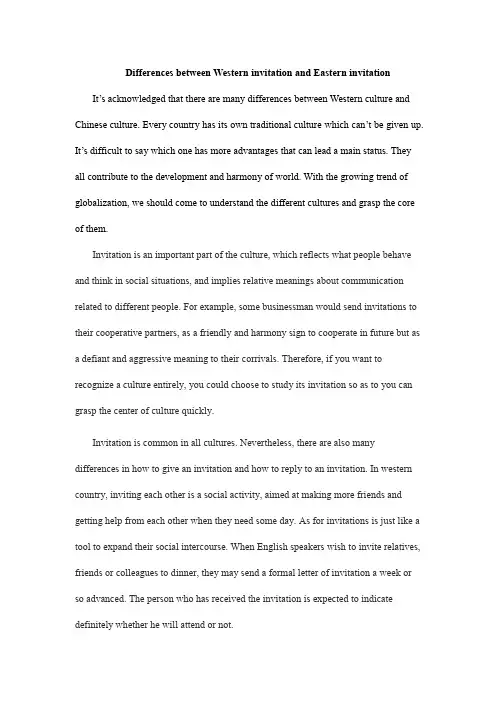
Differences between Western invitation and Eastern invitation It‟s acknowledged that there are many differences between Western culture and Chinese culture. Every country has its own traditional culture which can‟t be given up. It‟s difficult to say which one has more advantages that can lead a main status. They all contribute to the development and harmony of world. With the growing trend of globalization, we should come to understand the different cultures and grasp the core of them.Invitation is an important part of the culture, which reflects what people behave and think in social situations, and implies relative meanings about communication related to different people. For example, some businessman would send invitations to their cooperative partners, as a friendly and harmony sign to cooperate in future but as a defiant and aggressive meaning to their corrivals. Therefore, if you want to recognize a culture entirely, you could choose to study its invitation so as to you can grasp the center of culture quickly.Invitation is common in all cultures. Nevertheless, there are also many differences in how to give an invitation and how to reply to an invitation. In western country, inviting each other is a social activity, aimed at making more friends and getting help from each other when they need some day. As for invitations is just like a tool to expand their social intercourse. When English speakers wish to invite relatives, friends or colleagues to dinner, they may send a formal letter of invitation a week or so advanced. The person who has received the invitation is expected to indicate definitely whether he will attend or not.When you receive an invitation, you don't have to say yes or no immediately, but you should give an answer as soon as possible. Make sure you know the time and place of the party. Make sure you express pleasure or thanks to the host. If you are married or live with someone, you can bring him/her with you as long as your host knows that you have a spouse or partner. If the party includes business associates, a suit will be proper. If the party is just for friends, you don't need to dress formally.While In China invitation often occurs between old friends and relatives to talk about the past and brighten the chain with each other or renew friendship. For this invitation, people regard invitation as a passionate treat, and usually will attend it. But for other invitation, like business, politics, people always hold a little negative and unmeaning attitude even if it‟s very formal conference.When someone invites his friends to take part in a party, what he behaves is obviously different between Chinese and America.In America, men and women are more open to communicate, do not concern about if it‟s opposite sex overmuch, and one girl and one boy who has met first go to movie or eat together is very common to see. So people who have a dating sometimes don‟t mean that they are lovers, maybe they just want to stay together. If you want to invite an American girl alone, you must point to eat lunch or dinner, it‟s the different meaning. Generally speaking, an informal lunch, easy to be accepted while dinner is more serious, and people who are invited will behave formally and get the certain place on time. Chinese female students invited by American male classmate also should pay attention to the different with dinner and lunch. If you don't want toreceive someone‟s appointment or it makes you uncomfortable, you can be polite but stable to refuse him. In the United States, mutual respect is the based on communicative principle and rights.In China, people are very conservative and missish, they will be careful to receive any invitation no matter who invites them, especially someone who is unknown or meets first. By the traditional Chinese education, we mustn‟t optionally accept others‟gifts as if the one looks like a kind sheep. As a result, when a Chinese people receive an invitation, he will first take all matters into consideration, then he makes a decision about whether to go or not. Meanwhile, a Chinese don‟t give you a response as you are informing him while waiting a short time he will respond.It should be noted that in American culture, there are two kinds of invitation, one is …genuine invitation” , the other is “false invitation”. If one is not familiar with American culture maybe feel that Americans are not sincere or honest because he cannot tell the difference between “genuine invitation” and “false invitation”.American characters are cheerful and generous, optimistic. They usually stay up late and get up late, but have strong sense of time. When they say goodbye to you, they will say see you next day, find me when you are convenient, come to find me at any time and so on. These are just polite phraseologies to say goodbye when communicating with others, not real invited. If you drop at any time you probably get a cold treat because you interrupt their individual life.A false invitation usually includes the following elements. First, there is no exact time and place in the invitation. That means they don‟t want to really invite but out of politeness they talk to you. Second, if they use the word like should, must, etc. without getting you permission, it‟s normally a false invitation. In the United States, owing to the notion of equality, therefore, inviting people to a party probably will borrow someone else's time. People do what they want always respect the reflection of others, almost don‟t impose other.To sum up, with the growing trend of globalization, we should understand and grasp the differences between Chinese and American culture so as to we can handle the direction of the development of the world. Every culture has its own values and plays an important role in the world developing. We ought to respect every culture and devote ourselves to the trend creating a bright life.1. What are the differences in the concepts of friends between the Chinese andAmerican cultures?American thinks everyone is equal and should respect everyone. Therefore, they tend to use polite f orms such as “could you” and “would you” even with their friend s, and don‟t impose them friends. Many American want such time alone when they have problems. American apologizes to their friends over things like asking for help in some small matter or telephoning late at night. Besides, An American may feel that a friend needs privacy to “work out” a problem. So American may want to give you your privacy even if you don‟t want it.While Chinese people tend to make more direct requests to their friends. They address those know quite well in a very direct way. They may sound rude and demanding when they intend to sound friendly.2.Discuss the feasibility of a synthesis of Eastern culture and Western culture.In western culture a synthesis is not feasibility, people are most likely to value individual identity, which means the social unit is the individual and the interests of the individual are considered to be more important than those of the group.In Eastern culture a synthesis is feasibility. In eastern country, people tend to place high value on group identity rather than individual identity, which means quite contrary to the individualist cultures, the interests of the individual are lea important than those of the group. The social unit is the group. They may try their best to make the synthesis better.。
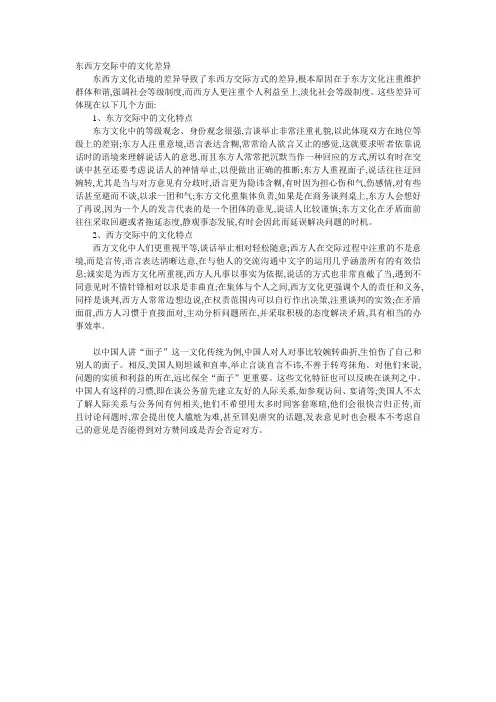
东西方交际中的文化差异东西方文化语境的差异导致了东西方交际方式的差异,根本原因在于东方文化注重维护群体和谐,强调社会等级制度,而西方人更注重个人利益至上,淡化社会等级制度。
这些差异可体现在以下几个方面:1、东方交际中的文化特点东方文化中的等级观念、身份观念很强,言谈举止非常注重礼貌,以此体现双方在地位等级上的差别;东方人注重意境,语言表达含糊,常常给人欲言又止的感觉,这就要求听者依靠说话时的语境来理解说话人的意思,而且东方人常常把沉默当作一种回应的方式,所以有时在交谈中甚至还要考虑说话人的神情举止,以便做出正确的推断;东方人重视面子,说话往往迂回婉转,尤其是当与对方意见有分歧时,语言更为隐讳含糊,有时因为担心伤和气,伤感情,对有些话甚至避而不谈,以求一团和气;东方文化重集体负责,如果是在商务谈判桌上,东方人会想好了再说,因为一个人的发言代表的是一个团体的意见,说话人比较谨慎;东方文化在矛盾面前往往采取回避或者拖延态度,静观事态发展,有时会因此而延误解决问题的时机。
2、西方交际中的文化特点西方文化中人们更重视平等,谈话举止相对轻松随意;西方人在交际过程中注重的不是意境,而是言传,语言表达清晰达意,在与他人的交流沟通中文字的运用几乎涵盖所有的有效信息;诚实是为西方文化所重视,西方人凡事以事实为依据,说话的方式也非常直截了当,遇到不同意见时不惜针锋相对以求是非曲直;在集体与个人之间,西方文化更强调个人的责任和义务,同样是谈判,西方人常常边想边说,在权责范围内可以自行作出决策,注重谈判的实效;在矛盾面前,西方人习惯于直接面对,主动分析问题所在,并采取积极的态度解决矛盾,具有相当的办事效率。
以中国人讲“面子”这一文化传统为例,中国人对人对事比较婉转曲折,生怕伤了自己和别人的面子。
相反,美国人则坦诚和直率,举止言谈直言不讳,不善于转弯抹角。
对他们来说,问题的实质和利益的所在,远比保全“面子”更重要。
这些文化特征也可以反映在谈判之中。
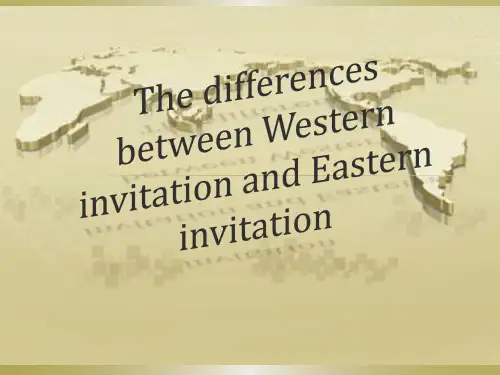
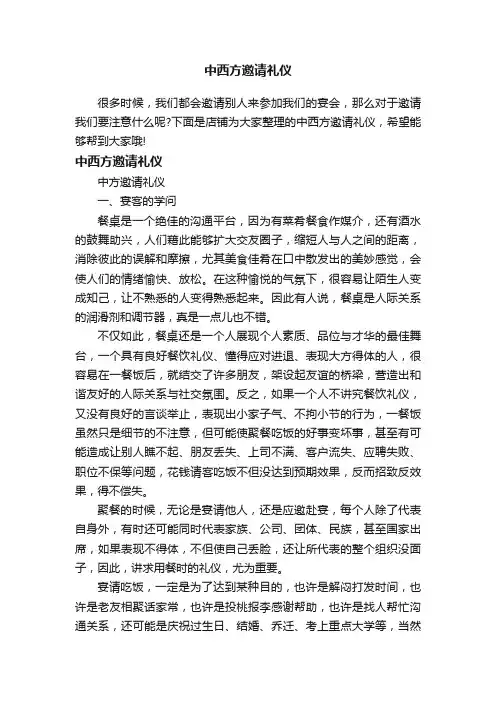
中西方邀请礼仪很多时候,我们都会邀请别人来参加我们的宴会,那么对于邀请我们要注意什么呢?下面是店铺为大家整理的中西方邀请礼仪,希望能够帮到大家哦!中西方邀请礼仪中方邀请礼仪一、宴客的学问餐桌是一个绝佳的沟通平台,因为有菜肴餐食作媒介,还有酒水的鼓舞助兴,人们藉此能够扩大交友圈子,缩短人与人之间的距离,消除彼此的误解和摩擦,尤其美食佳肴在口中散发出的美妙感觉,会使人们的情绪愉快、放松。
在这种愉悦的气氛下,很容易让陌生人变成知己,让不熟悉的人变得熟悉起来。
因此有人说,餐桌是人际关系的润滑剂和调节器,真是一点儿也不错。
不仅如此,餐桌还是一个人展现个人素质、品位与才华的最佳舞台,一个具有良好餐饮礼仪、懂得应对进退、表现大方得体的人,很容易在一餐饭后,就结交了许多朋友,架设起友谊的桥梁,营造出和谐友好的人际关系与社交氛围。
反之,如果一个人不讲究餐饮礼仪,又没有良好的言谈举止,表现出小家子气、不拘小节的行为,一餐饭虽然只是细节的不注意,但可能使聚餐吃饭的好事变坏事,甚至有可能造成让别人瞧不起、朋友丢失、上司不满、客户流失、应聘失败、职位不保等问题,花钱请客吃饭不但没达到预期效果,反而招致反效果,得不偿失。
聚餐的时候,无论是宴请他人,还是应邀赴宴,每个人除了代表自身外,有时还可能同时代表家族、公司、团体、民族,甚至国家出席,如果表现不得体,不但使自己丢脸,还让所代表的整个组织没面子,因此,讲求用餐时的礼仪,尤为重要。
宴请吃饭,一定是为了达到某种目的,也许是解闷打发时间,也许是老友相聚话家常,也许是投桃报李感谢帮助,也许是找人帮忙沟通关系,还可能是庆祝过生日、结婚、乔迁、考上重点大学等,当然更可能是为了找对象、追朋友而请客。
钱钟书先生在其《吃饭》一文中说:“吃饭有时候很像结婚,名义上最主要的东西,其实往往是附属品。
”也就是说有时宴请吃饭讲究的其实不只是吃饭吃菜,而是有其他目的;正如嫁阔佬的小姐,并不一定是为了爱情而结婚,而可能是为了找个长期饭票有稳定的生活而结婚。
东西方语言文化上的差异例子东西方语言文化上存在着很多差异,这些差异源于历史、地理、宗教、传统习俗等多种因素的综合影响。
下面将列举一些关于语言和文化差异的例子。
一、语言差异:1.语音差异:东方语言(如中日韩语)中的音节比较平均,而西方语言(如英语、法语)中的音节则较为明显,尤其是重音。
2.语法差异:东方语言中的语法结构较为灵活,注重使用助词来表达句子的关系,而西方语言中则更注重词序和语法规则。
3.字词差异:东方语言中的字词往往比较直接,具有明确的意义,而西方语言中往往有更多的同义词和近义词。
4.文字差异:东方语言(如中文、日文)中使用汉字或象形文字,而西方语言(如英文、法文)使用拉丁字母或西里尔字母等。
二、文化差异:1.礼仪差异:东方文化强调尊重和敬畏,注重面子和礼貌,比如鞠躬、施礼等,而西方文化更注重个人独立和自由。
2.饮食差异:东方文化中注重用筷子进餐,有团餐的习俗;而西方文化中通常使用刀、叉、勺等餐具,强调个人用餐。
3.宗教差异:东方文化受佛教、道教和儒家思想影响较大,注重个人修养和心灵寄托,而西方文化则常常受基督教的影响,强调信仰、普世价值观等。
4.时间观念差异:东方文化中时间观念相对宽松,注重人际关系、团体利益;而西方文化中时间观念较为严谨,注重效率和个人主义。
5.社会结构差异:东方文化中重视家庭和社会的集体责任,注重孝顺和家族观念,而西方文化更注重个人权利和自由。
三、交流差异:1.眼神交流:东方文化中,直视他人眼睛被认为是一种不礼貌的行为;而在西方文化中,直视他人眼睛被认为是一种尊重和诚实的表达方式。
2.面部表情:东方文化中,控制自己的情绪和面部表情被认为是一种美德;而西方文化中,表达自己的情绪和面部表情被认为是一种自然和坦诚的行为。
3.身体语言:东方文化中,直接触碰他人身体被认为是一种侵犯私人空间的行为,一般避免接触;而在西方文化中,触碰他人身体可能被视为友好和亲近的表达方式。
总结起来,东西方语言文化的差异体现在语音、语法、字词和文字上。
邀请函的文化差异需要注意什么在当今全球化的时代,我们经常会有向不同文化背景的人发送邀请函的需求。
无论是商务活动、社交聚会还是学术交流,邀请函都是我们与他人建立联系、表达诚意的重要方式。
然而,由于不同国家和地区的文化差异,在撰写和发送邀请函时,我们需要格外小心,以免因为不了解当地的文化习俗而造成误解或冒犯。
那么,在面对邀请函的文化差异时,我们究竟需要注意哪些方面呢?首先,语言表达是一个关键的因素。
不同的文化对于语言的使用和理解有着不同的习惯。
比如,在一些东方文化中,人们倾向于使用较为含蓄、委婉的语言来表达邀请,强调礼貌和尊重。
而在西方文化中,语言可能会更加直接、明确。
因此,在撰写邀请函时,我们需要根据邀请对象的文化背景来调整语言风格。
对于英语为主要语言的国家,邀请函的语言通常简洁明了,重点突出活动的时间、地点、主题和目的。
例如:“Dear _____, We are delighted to invite you to our party on Saturday, July 10th at 7 pm at 123 Main Street The theme of the party is Summer Celebration We look forward to seeing you there!” 这种直接的表达方式能够让对方迅速获取关键信息。
然而,如果是向日本或韩国等国家的人士发送邀请函,语言可能需要更加谦逊和委婉。
比如:“尊敬的_____先生/女士,诚邀您拨冗参加我们将于_____(具体日期)举办的活动。
此次活动旨在增进彼此的交流与合作,若您能莅临,我们将深感荣幸。
”其次,礼仪规范在不同文化中也存在差异。
在一些文化中,邀请函的发送方式和时间有着严格的规定。
比如,在正式的商务邀请中,德国人通常会提前较长时间发送邀请函,以显示对对方的尊重和重视。
而在一些拉丁美洲国家,邀请的时间可能会相对较晚。
另外,邀请函的格式和内容也会因文化而异。